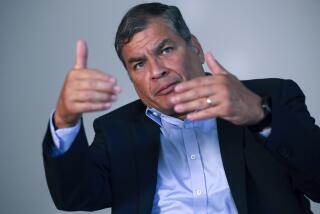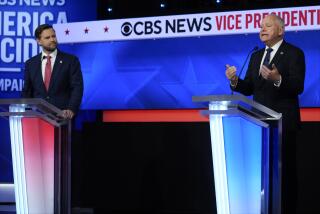Visa Policy Banning Ideologues, Leaders Criticized; Defenders Point to Terrorism
WASHINGTON — At the recent meeting here of the American Society of Newspaper Editors, Secretary of State James A. Baker III labored to explain why Presidents Fidel Castro of Cuba and Daniel Ortega of Nicaragua had been refused visas to enter the United States--and thus could not address the editors.
It was not a matter of national diplomatic status. Nicaragua has diplomatic relations with the United States, even though Cuba does not. It was not merely that their nations are considered to be hostile. Last year, more than 26,000 Nicaraguan citizens were permitted to visit the United States, as were almost 8,000 Cubans.
Rather, Ortega and Castro were barred because of their prominent positions on a special list maintained by the government of persons, who by virtue of their leadership roles in certain unfriendly governments or their personal ideologies, are considered threats to the U.S. public interest.
‘Harmful to Diplomatic Efforts’
Admitting them, explained Baker, “would be harmful to our diplomatic efforts” with these nations and with others.
Thirty-seven years after Congress enacted key policies for such visa bans during the national alarm over communist subversion, some lawmakers and others are increasingly questioning how certain people are placed on the special lists and whether the public interest is truly served by this precaution.
A vocal core of critics is insisting that the policy is antiquated, prone to political abuse and interferes with the public’s right to hear opposing views on important issues.
The issue centers “not only on the unfair exclusion of people but also on the denial of opportunities for people already here to hear ideas from around the world,” Rep. Bruce A. Morrison (D-N.J.) says.
However, the policy’s equally adamant defenders insist that with terrorist threats against the United States proliferating, this is the wrong time to be easing entry controls on the nation’s known enemies.
Sees Rationale
“I see no reason why individuals who advocate the overthrow of our government should not be excluded from this country,” Rep. Lamar Smith (R-Tex.) argued in a recent subcommittee debate on the issue.
Legislation authored by Rep. Barney Frank (D-Mass.) that would liberalize the U.S. visa policy was recently approved by the House Judiciary Committee’s subcommittee on immigration, headed by Morrison.
Its chances of winning full congressional passage are uncertain, but the measure is expected to elevate congressional and public debate on what and who in the current American political and social climate should be considered too “subversive” to be allowed inside the nation’s borders.
The law, as provided largely in the 1952 McCarran-Walter Act, currently allows the United States to refuse visas to people based on dozens of provisions, including health, criminal record, drug use, sexual conduct, mental competence and even polygamy. Applicants also can be turned down if they “are or at any time have been anarchists, communists or other political subversives.”
‘Ideological Grounds’
These last provisions, along with one addressing whether the visitor would be “prejudicial to the public interest or endanger the welfare, safety or security of the United States,” are the so-called “ideological grounds” at the core of the dispute.
Last year, 44,184 people initially were refused visas on ideological grounds. After supplying additional information, all but 951 were allowed in, according to the State Department.
Furthermore, the department said, presidential proclamations in place bar, across-the-board, “certain classes” of government officials from Cuba, Nicaragua and Panama, with exemptions for assigned diplomatic officers and United Nations personnel. Officials of a number of other nations not covered by specific proclamations are also routinely excluded, such as Libya, Iran and Eastern Bloc states.
Cornelius Scully, at the State Department bureau of counsular affairs, said there is no reason to bar all citizens of hostile countries because “I don’t think you can attribute to everybody in a country the goals, objectives and motivations that the government of that country may reflect.”
Concern for Terrorists
But the Administration insists some officials, opinion leaders and ideologues must be kept out. In a letter to Frank, the Justice Department termed it “essential” that the government be able to exclude aliens who “advocate, teach or engage in” terrorism, as well as those “who advocate or who are members of or affiliated with organizations advocating totalitarian doctrines, including the Communist Party.”
Entry into the United States is a privilege, not a right, the policy’s defenders assert. The United States has no obligation to allow foreigners to promote hostile causes here or potentially help the intelligence efforts of U.S. adversaries.
Critics, however, complain that those entry restrictions are much too broad, as well as being hypocritical in a democratic society.
Many visa denials are “irrational and contrary to the high value Americans place on free speech,” charged Kenneth Melley of the National Education Assn., citing the exclusion of Colombian novelist Gabriel Garcia Marquez, Italian novelist Primo Levi and Mexican writer Nobel laureate Carlos Fuentes.
Writers and Labor Leaders
Over the years, a number of foreign writers, labor leaders and other outspoken critics of the United States have been blocked because of their beliefs.
Susan Benda, legislative analyst with the Washington office of the American Civil Liberties Union, said the law’s vague standards also make it particularly prone to political bias. In the Democratic Administration of former President Jimmy Carter, she said, “right-wing types were denied entry” from foreign countries, while in former President Ronald Reagan’s Republican Administration, “left-wing types” tended to have more difficulty.
What is needed, she said, is a “repeal of all ideological grounds” for visa denials, replacing them with “security grounds.”
More to Read
Sign up for Essential California
The most important California stories and recommendations in your inbox every morning.
You may occasionally receive promotional content from the Los Angeles Times.









